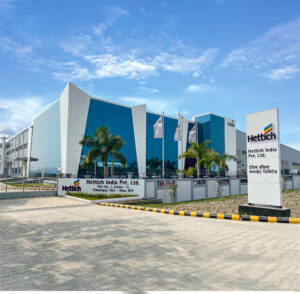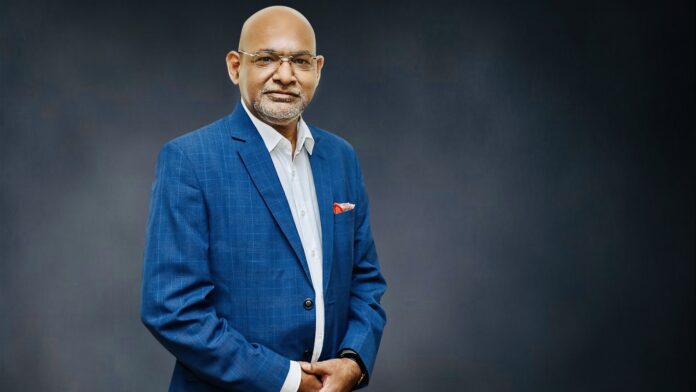In an engaging conversation, managing director Anil K Goel revealed that Hettich will invest Rs 1000crore in India in the next 4-5 years. He gave me a glimpse of Hettich India’s game plan for the coming years. We also discussed the state of the furniture industry.
India’s largest furniture fittings manufacturer Hettich will invest Rs 1000crore over the next 4-5 years, for setting up a new plant and expanding existing production capacities. It will also boost its skill development initiatives by collaborating with state governments in setting up training centres on public private partnership (PPP) model.
As part of this capex, Hettich has recently committed an investment of Rs 750 crore for the upcoming International Furniture Park, being set up by Tamil Nadu government near the port town of Tuticorin. It has already identified a parcel of land for setting up manufacturing and training facilities at the park. The company has earmarked another Rs 250 crore for upgrading existing infrastructure and setting up more training centres.
Hettich India is the Indian subsidiary of 1.35 billion euro furniture fittings major Hettich GmbH based in Kirchlengern, Germany. The multinational had registered a 26 percent growth in its global turnover during 2021 as compared to the previous year.
Revealing a strategic posture of taking leadership position in key initiatives, managing director Anil K Goel explained the reasons why Hettich will invest Rs 1000crore at this juncture, “The Indian government has identified furniture as one of the key industries for the expansion of made-in-India products across the globe. The International Furniture Park is an outcome of this vision. As the largest manufacturer of furniture fittings in the country, we have taken the initiative of partnering with the Tamil Nadu government in the establishment of the park.”
Goel is part of the furniture committee that advises Ministry of Trade and Commerce at the Centre. So he is well-positioned to provide the inputs that can help shape policy. “Based on extensive study, the government has decided to adopt two approaches to boost the furniture sector. First is to build competencies for making the entire value chain, right from the raw materials to manufacturing and logistics, cost efficient. Second is to double or triple Indian exports by increasing the size of the industry within the next 5-6 years.”
ALSO READ: India is a Key Market for Investment, Growth: Roca
Hettich India, set up in 2001 in joint venture with the Saroj Poddar group company Adventz, has invested almost Rs 600 crore over the past two decades, to emerge as the largest furniture fittings manufacturer in the country. The company’s first production unit came up in Gujarat in 2013 to manufacture wire products for the domestic market. In 2015 it set up the second unit, also in Gujarat, to manufacture fittings as an import substitute. Its third plant, which came up in Indore in 2019 with an investment of Rs 400 crore, was designed to serve domestic and export markets. The company offers free design service to its B2B and end customers through a network of 12 application centres in top cities of the country as well as through its website. “Through these support services we aim to help our customers grow their businesses. This is our approach for ensuring our own growth.”
The Indore plant, according to Goel, is the largest plant in the Hettich world. Considered to be amongst the most advanced for manufacturing hinges, it is a fully automated facility fitted with state-of-the-art tool room, and machines sourced from Germany and operated by around 200 people. This plant is a zero liquid discharge facility, compliant with stringent environment related norms. “I would not hesitate to say that such a facility is not even available in China.”

While Hettich India has been exporting its products to several European countries, USA and the SAARC region, in 2021 it exported auto closing and soft closing hinges worth over Rs 50 crore to China. Goel considers this as a major achievement for Hettich India and a testimony of its production efficiency and quality control. “We are the first Indian company to export hardware to China. In fact our production is suited to all global markets, there are no variations in quality or any other parameters.”
“Hettich has been able to save substantial foreign exchange for the country by producing products that are import substitutes. Some of the hinges that we produce are not even being made in Germany. Moreover, we are investing heavily to bring in the most advanced technology for manufacturing products that are world class.”
In addition to furniture fittings, the company has recently expanded into the segments of architectural hardware, kitchen appliances (Blaupunkt, Germany) and solid surfaces (Silestone, Spain). For these categories Hettich GmbH has entered into long term strategic alliances with the respective brands, for building a robust and sustainable business in various markets including India.
In 2017, Hettich India had launched the Hepo brand of hardware and furniture fittings for the value segment. The products for this business are sourced from quality manufacturers across the globe, and a separate business unit markets them in India as well as other countries.
Explaining the rationale of this dual brand strategy, Goel said, “Hepo is a value brand, unlike Hettich which is a premium brand. The product portfolios, teams and the dealer networks for both the brands are different. There’s no overlapping. Our motto with Hepo is to provide assured quality at competitive prices. Through smart sourcing we are able to offer our customers prices that are more competitive than of Chinese sources.”
Goel has taken leadership position in the skill development domain as well, by establishing the Hettich Poddar Wood Working Institute (HPWWI) under Hettich’s CSR program. HPWWI has set up well equipped centres at New Delhi and Mumbai, while Bengaluru will be operational soon, to impart training to carpenters, entrepreneurs, and industry professionals at nominal charge or on free-of-cost basis. Besides, it is in talks with state governments to set up satellite centres at 10-12 locations.
The HPWWI has been recognised as a Pradhan Mantri Kaushal Kendra (PMKK), a status accorded by NSDC to benchmark and aspirational model training centres. The not-for-profit institute has an annual budget of Rs 7-8 crore, and aims to train 10,000 persons each year in the field of wood working, besides assuring them employment within the furniture and home improvement industry.
Goel warns that since the furniture sector is at a transformational stage, skill development is an urgent requirement. “We need skilling, upskilling and re-skilling on a massive scale. We are urging the government to adopt the public private partnership model, so that the skilling initiatives of the industry can be ramped up. Our prime minister Narendra Modi has rightly stated that an unskilled person will always earn less than a skilled person, and skilling is the most effective way to make people employable and raise their income levels.”
ALSO READ: Hansgrohe is Expanding into Ceramics & Bathroom Furniture, Here’s Why
The Indian furniture industry was deprived of capital till 2015, as it was reserved for the micro and small sector. Resultantly, it is characterised by lack of competitiveness, scale and skilled manpower. The industry has remained grossly behind the curve, unable to respond to fast-changing tastes, quality preferences and buying power of the Indian consumer. The market is replete with imports of varying hues, from the cheap-dumped type to the premium and luxury branded variety, often bearing little relevance to Indian tastes and conditions. The absence of pan-India indigenous brands, barring a few, is also glaring. An estimated $8 billion worth of furniture is imported into India each year.
The furniture fittings industry, which essentially is a business-to-business enterprise that serves the needs of the furniture industry, remains underdeveloped as well. Goel explained that furniture fittings are technical products, and their production requires high infusion of capital. While Germany has traditionally been the global hub for design and development in furniture fittings, China has emerged as the hub for re-engineering and mass production.
“Constant research and development is needed to visualise future lifestyles, and design the furniture and the necessary furniture fittings. We have to continuously improve the space efficiency, aesthetics and functionality of the furniture by developing newer fittings. Furniture is no longer a utility item, rather it is a lifestyle product. Considering that Hettich will invest Rs 1000crore – it is the first company in India that is talking of large scale investment in manufacturing.”
It is in such a scenario that the past and forthcoming investments of Hettich in India gain relevance. It may not be incorrect to say that Hettich has been the torchbearer for the furniture fittings industry in India, and through aggressive growth plans, it could facilitate the placement of India on the global furniture map in the very near future.


